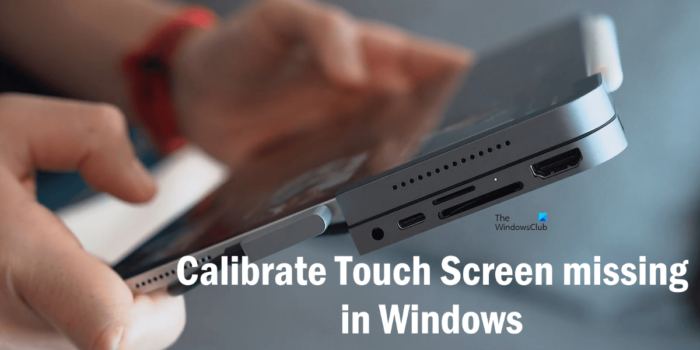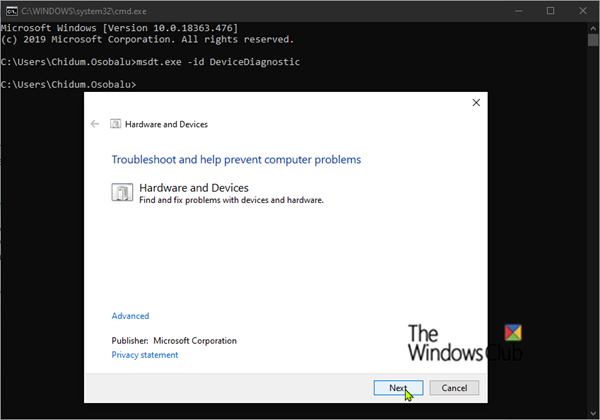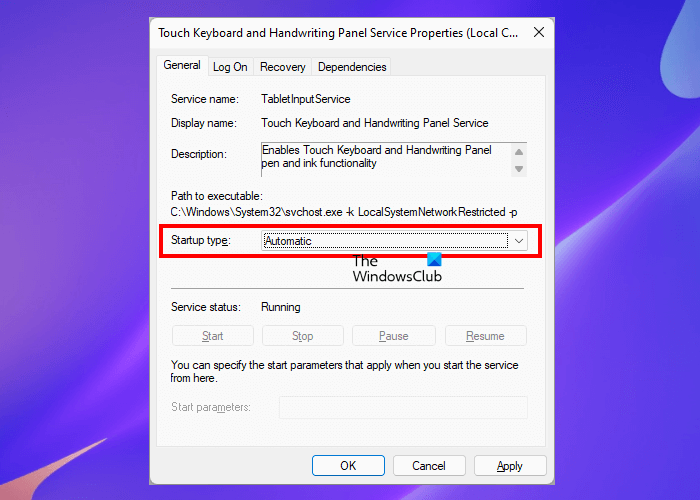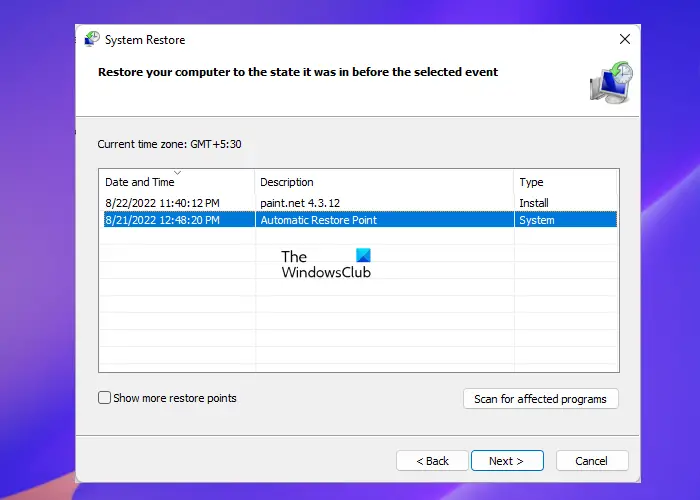Some users have reported that their touch screens stopped working. When they opened Settings to calibrate their touch screen, they found the calibrate touch screen option missing from their Windows 11/10 computers. Yet others have found the Calibrate button greyed out. Windows 11/10 has a touch screen calibration option for the touch-capable displays. When you use this option, a crosshair appears on your screen. You have to tap on these crosshairs to calibrate your touch screen. If the Calibrate Touch Screen is missing in your Windows 11/10 PC, the solutions provided in this post may help you.

Calibrate Touch Screen missing in Windows 11/10
If you find the Calibrate Touch Screen option missing in Windows 11/10, the following solutions may help you resolve the issue.
- Run Hardware and Devices Troubleshooter
- Calibrate your touch screen via the Control Panel
- Disable and re-enable the HID-compliant touch screen driver
- Uninstall and reinstall the HID-compliant touch screen driver
- Check the status of the Touch Keyboard and Handwriting Panel Service
- Boot to UEFI and test your touch screen
- Perform a System Restore
Let’s see all these solutions in detail.
1] Run Hardware and Devices Troubleshooter
Hardware and Devices Troubleshooter helps users resolve the issues occurring on hardware devices that can be part of their system or connected externally, provided the hardware is not faulty. Running the troubleshooter has fixed the issue for many users. It should also help you.

To run Hardware and Devices Troubleshooter, you have to execute the following command in the Command Prompt:
msdt.exe -id DeviceDiagnostic
After running the Hardware and Devices Troubleshooter. check if the problem persists.
2] Calibrate your touch screen via the Control Panel
You can also calibrate the touch screen from the Control Panel. If the option to calibrate your touch screen is missing in Windows 11/10 Settings app, open the Control Panel and see if the option is available there.
The steps are as follows:
- Open the Control Panel.
- Change the View by mode to Large icons.
- See if the Tablet PC Settings option is available. If yes, click on that and you will be able to calibrate your touch screen.
3] Disable and re-enable the HID-compliant touch screen driver
Open the Device Manager and disable and re-enable your HID-compliant touch screen driver. See if it helps. The steps are as follows:
- Open the Device Manager.
- Expand the Human Interface Devices node.
- You will see your touch screen driver there. Right-click on the HID-compliant touch screen driver and select Disable device.
- Wait for a few minutes, then right-click on the HID-compliant touch screen driver and select Enable device.
Now, check if the issue is fixed.
4] Uninstall and reinstall the HID-compliant touch screen driver
We also suggest you uninstall and reinstall the HID-compliant touch screen driver. If the Device Manager does not show the HID-compliant touch screen driver, you can download its latest version from the official website of the manufacturer and install it manually.
The following instructions will help you:
- Open the Device Manager.
- Expand the Human Interface Devices node.
- If you see the HID-compliant touch screen driver, right-click on it and select Uninstall device.
- Now, download the latest version of your touch screen driver from the manufacturer’s website.
- Install the driver manually.
5] Check the status of the Touch Keyboard and Handwriting Panel Service
The Touch Keyboard and Handwriting Service is responsible for the proper functioning of the touch keyboard and handwriting panel pen and ink on Windows 11/10. If this service is stopped, you will not be able to use your touch keyboard and pen. If the calibrate touch screen option is missing in Windows 11/10, check the status of the Touch Keyboard and Handwriting Panel Service. The following instructions will help you with that:

- Click on Windows Search and type services.
- Select the Services app from the search results.
- Locate the Touch Keyboard and Handwriting Panel Service.
- If it is not running, right-click on it and select Properties.
- Under the General tab, select Automatic in the Startup type drop-down.
- Click Start.
- Click Apply and then click OK.
This should bring the missing calibrate option.
6] Boot to UEFI and test your touch screen (solution for Surface devices users)
This solution is for Surface device users. Boot your system to UEFI and check if the touch screen works. Because UEFI operates independently of Windows, booting your system to UEFI will let you know whether the issue is associated with hardware or software. If the touch screen works in UEFI, the issue is with your drivers. In this case, uninstalling and reinstalling the touch screen driver can bring the calibrate option back. We have already explained how to uninstall and reinstall the touch screen driver earlier in this article.
To boot your Surface device to UEFI, shut down your Surface laptop. When it is turned off, press and hold the Volume up key and turn on your laptop. You have to press and hold the Volume up key until you see the Microsoft or Surface logo on your screen.
If your touch screen does not respond in UEFI, there might be a hardware issue. You can contact Microsoft support if your Surface laptop is under warranty.
7] Perform a System Restore
System Restore is a tool from Microsoft that helps users protect and repair their computer software. It takes snapshots of your system files and Windows Registry and saves them as Restore Points. You can restore your system using the System Restore points and take your system to the state before the issue started occurring on your system.

Restore your system using the System Restore tool and see if it helps. When you open the System Restore tool, you will see the date on which Windows created the restore points. If you select the Choose a different restore point on the System Restore window, Windows will show you all the Restore Points along with the date and time they were created. Select that Restore Point which was created before the problem started occurring on your computer. This should work.
Do note that System Restore will not delete your personal data. But from the safety point of view, we recommend you backup your data on an external hard disk.
Read: HID-Compliant Touch Screen Driver is missing.
How do I calibrate a touch-enabled display in Windows 11?
You can easily calibrate the Microsoft Surface touch display and other touch-capable displays in Windows 11 via the Windows 11 Settings. Click on Windows Search and type calibrate the screen for pen or touch and select the desired option. Alternatively, open the Control Panel and type Tablet PC Settings in the Control Panel search, and select the desired option.
Does Windows 11 support a touch screen?
Yes, Windows 11 supports a touch screen. If you have a touch screen capable display and it is not working, you can update or reinstall the HID-compliant touch screen driver. Or you can download the latest version of the touch screen driver from the manufacturer’s website and install it manually.
I hope this helps.
Read next: Fix Razer Blade touch screen not working.
Leave a Reply